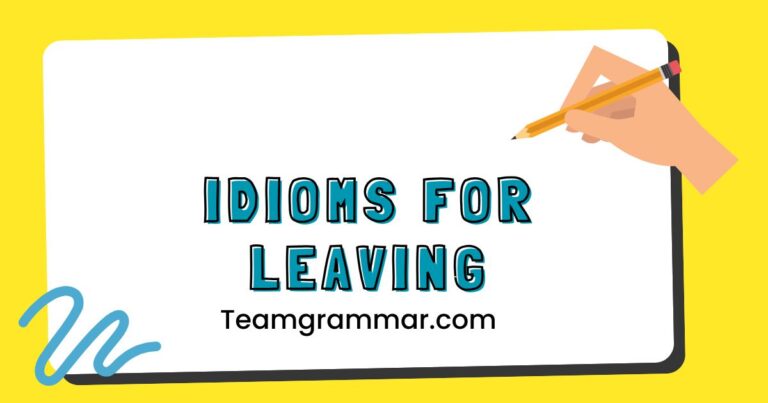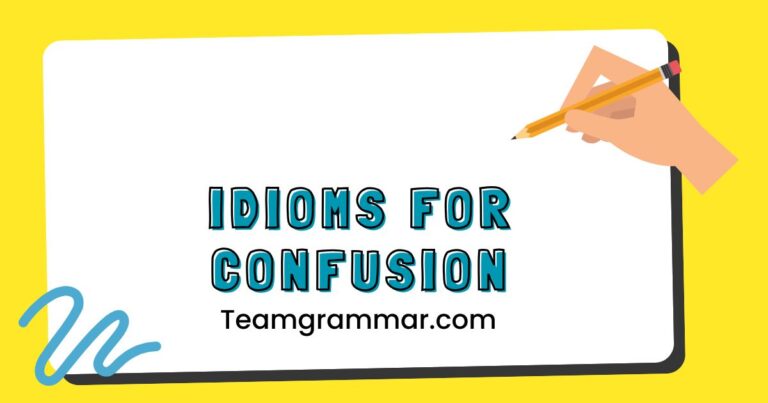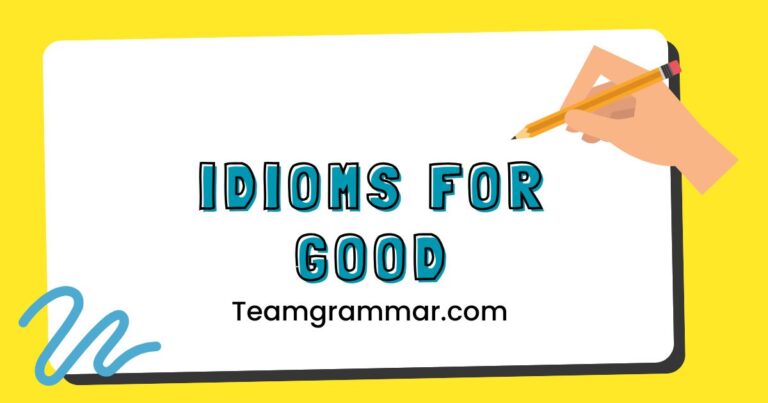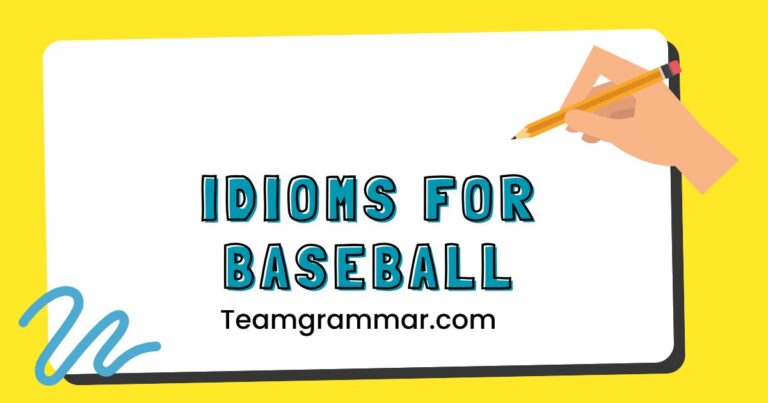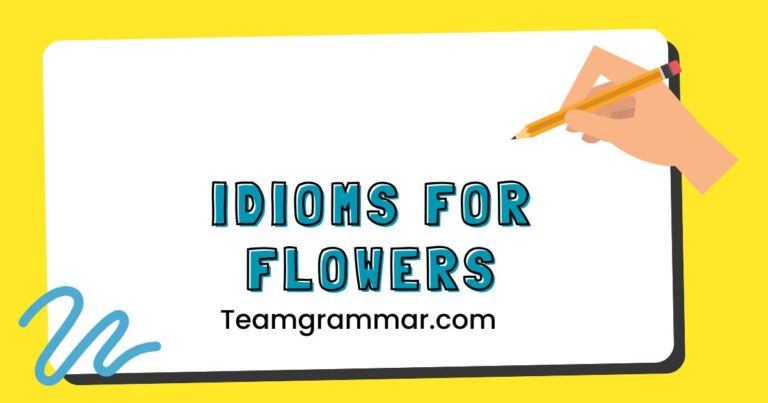31 Idioms For Funny: Mastering Humorous Expressions
Idioms add color and depth to the English language, and those related to humor are particularly engaging. Understanding these idioms not only enhances comprehension but also allows you to express yourself more vividly and connect with others on a humorous level.
This article delves into the world of idioms used to describe funny situations, people, and things, providing a comprehensive guide for English learners of all levels. By mastering these expressions, you’ll be able to inject humor into your conversations, understand jokes better, and appreciate the nuances of English humor.
Table of Contents
- Introduction
- Definition of Idioms for Funny
- Structural Breakdown
- Types and Categories of Funny Idioms
- Examples of Idioms for Funny
- Usage Rules
- Common Mistakes
- Practice Exercises
- Advanced Topics
- FAQ
- Conclusion
Definition of Idioms for Funny
An idiom is a phrase or expression whose meaning cannot be understood from the literal meanings of its individual words. Instead, it has a figurative meaning that is known through common use.
Idioms related to “funny” are phrases that describe situations, people, or things that are amusing, humorous, or ridiculous. These idioms often add a layer of expressiveness and cultural understanding to communication.
Classification:Idioms for funny fall under the broader category of figurative language. They can be further classified based on the type of humor they convey, such as sarcasm, irony, exaggeration, or simple amusement.
They are used in both spoken and written English and are essential for understanding and appreciating humor in various contexts.
Function:The primary function of these idioms is to add color and humor to language. They allow speakers and writers to express their amusement or to describe something as funny in a more vivid and engaging way than simply saying “it’s funny.” Idioms also often carry cultural nuances, reflecting the unique sense of humor within a particular community or region.
Understanding these idioms can provide insights into the cultural values and perspectives of English speakers.
Contexts:Idioms for funny can be used in a wide range of contexts, from informal conversations with friends to more formal settings like presentations or written articles. However, it’s essential to be mindful of the audience and the context to ensure that the idiom is appropriate and well-received.
Using idioms correctly can make your communication more engaging and memorable.
Structural Breakdown
The structure of idioms, in general, is fixed. You cannot change the words or their order without altering the meaning or making the idiom nonsensical.
For idioms related to “funny,” the structure often involves a combination of words that, when taken literally, might not seem related to humor at all. The humorous effect comes from the unexpected combination and the figurative meaning that has been established over time.
For example, the idiom “to have a cow” means to get very upset or excited about something, often in a humorous way. Structurally, “to have a cow” is a simple verb phrase consisting of “to have” + a noun phrase “a cow.” However, the humor arises from the incongruity of associating a cow with strong emotions.
Similarly, “a barrel of laughs” is a noun phrase that describes something very funny, but the literal image of a barrel filled with laughs is absurd, contributing to the humor.
Understanding the structural elements of these idioms can help learners remember and use them more effectively. By recognizing the fixed nature of the phrases and the unexpected combinations of words, learners can appreciate the creativity and humor embedded within the idioms.
Types and Categories of Funny Idioms
Idioms for funny can be categorized in several ways, based on what aspect of humor they emphasize. Here are some common categories:
Describing Funny People
These idioms are used to describe individuals who are amusing, witty, or naturally funny. They often highlight the person’s ability to make others laugh or their quirky personality traits.
Describing Funny Situations
These idioms describe events, incidents, or circumstances that are humorous or ridiculous. They often involve unexpected or absurd situations that evoke laughter or amusement.
Idioms of Exaggeration
These idioms use hyperbole or exaggeration to emphasize the humor in a situation. They often involve over-the-top descriptions that are meant to be taken lightly and humorously.
Idioms of Irony and Sarcasm
These idioms use irony or sarcasm to convey humor. They often involve saying the opposite of what is meant, with the intention of being humorous or critical.
Examples of Idioms for Funny
Here are examples of idioms for funny, organized by category:
Examples Describing Funny People
The following table presents a collection of idioms used to describe individuals known for their humor and wit. Each idiom is accompanied by a definition and an example sentence to illustrate its usage in context.
| Idiom | Definition | Example Sentence |
|---|---|---|
| A card | A funny or amusing person. | He’s such a card; he always has everyone in stitches. |
| A scream | Someone who is very funny. | Sarah is a scream; her jokes are always hilarious. |
| A laugh a minute | Someone who is constantly making people laugh. | Working with him is a laugh a minute; he’s always cracking jokes. |
| Life of the party | Someone who is lively and entertaining at social gatherings. | John is always the life of the party; he knows how to keep everyone entertained. |
| Comedian | A person who entertains an audience by telling jokes or acting in a funny way. | Even though he isn’t a professional, everyone thinks of him as a comedian because he is so funny. |
| Joker | A person who is fond of joking. | Mark is a joker, always playing pranks on his colleagues. |
| Wit | A person whose remarks are clever and amusing. | She is known for her sharp wit and insightful humor. |
| Stand-up | A comedian who performs live in front of an audience. | The stand-up at the comedy club last night was absolutely hilarious. |
| Funny bone | The part of a person that makes them laugh. | He really tickles my funny bone with his silly antics. |
| Clown | A person who amuses others by ridiculous behavior. | Despite his serious job, he’s a bit of a clown at heart. |
| A caution | A person who is eccentric or amusing. | Old Mr. Henderson is a real caution; his stories are unbelievable. |
| A bundle of laughs | Someone who is very funny and entertaining. | She’s a bundle of laughs; you’ll enjoy spending time with her. |
| A hoot | A person who is very amusing or entertaining. | He’s a real hoot; I always enjoy his company. |
| A caution to the wind | Someone who is carefree and amusingly reckless. | She throws caution to the wind and always makes us laugh with her daring adventures. |
| A barrel of monkeys | A group of people who are very lively and energetic. | The kids were a barrel of monkeys at the birthday party. |
| A happy camper | Someone who is cheerful and content. | He’s always a happy camper, no matter what the situation. |
| A ray of sunshine | Someone who brings joy and happiness to others. | Her positive attitude makes her a ray of sunshine in the office. |
| A character | An interesting or amusing person. | He’s quite a character; you never know what he’ll do next. |
| The class clown | Someone who is always making jokes and disrupting the class. | He was the class clown in high school, always trying to make his friends laugh. |
| A funny man/woman | A person who tells jokes and makes people laugh. | She’s a funny woman; her comedy routines are hilarious. |
| A wag | A humorous person. | He’s a wag, always cracking jokes and making people laugh. |
| A witcracker | Someone who is known for their clever and funny remarks. | She’s a witcracker, always coming up with the most amusing comments. |
| A card sharp | A skilled and amusing person. | He’s a card sharp at parties, always entertaining everyone with his stories. |
| A merry fellow | A cheerful and humorous person. | He’s a merry fellow, always spreading joy and laughter wherever he goes. |
| A jolly soul | A cheerful and good-natured person. | She’s a jolly soul, always brightening up everyone’s day with her laughter. |
Examples Describing Funny Situations
The following table presents common idioms to describe situations that are inherently funny or have amusing outcomes. Each entry provides the idiom, its meaning, and a contextual example to illustrate its usage.
| Idiom | Definition | Example Sentence |
|---|---|---|
| A comedy of errors | A series of unfortunate or misguided events that result in a humorous outcome. | The whole trip was a comedy of errors, from the missed flight to the wrong hotel reservation. |
| A laughing matter | Something that is not serious and can be joked about. | Don’t worry, it’s not a laughing matter; we can fix it easily. |
| In stitches | Laughing uncontrollably. | The comedian had the audience in stitches with his hilarious jokes. |
| Rolling in the aisles | Laughing very hard, often to the point of physical discomfort. | The movie was so funny that everyone was rolling in the aisles. |
| A riot | A very funny or entertaining situation. | The party was a riot; everyone had a great time. |
| A scream | A situation that is extremely funny. | The play was a scream; I couldn’t stop laughing. |
| A hoot | A very enjoyable and amusing experience. | The concert was a hoot; we danced all night. |
| A barrel of laughs | A situation or event that is very funny. | The office party was a barrel of laughs; everyone enjoyed the games and jokes. |
| A circus | A chaotic and disorganized situation, often amusingly so. | Trying to get everyone ready in the morning is a circus. |
| A funny farm | A mental institution or a situation that seems chaotic or crazy. | Sometimes this office feels like a funny farm with all the strange things that happen. |
| Fit to be tied | Extremely annoyed or angry, but also somewhat humorous in its intensity. | She was fit to be tied when she found out her car had been towed. |
| Go bananas | To become very excited or crazy in a funny way. | The crowd went bananas when the band started playing their hit song. |
| Have a cow | To become very upset or excited about something, often in a humorous way. | My mom had a cow when she saw the mess I had made in the kitchen. |
| Laugh your head off | To laugh very hard and for a long time. | I laughed my head off watching that comedy show. |
| Tickle someone’s funny bone | To make someone laugh. | His jokes always tickle my funny bone. |
| Crack someone up | To make someone laugh a lot. | His silly faces always crack me up. |
| Lighten the mood | To make a situation less serious or tense by being funny. | He told a joke to lighten the mood after the serious meeting. |
| A joke | A situation or event that is ridiculous or absurd. | The whole situation was a joke; nothing went as planned. |
| For a laugh | Doing something just for fun or amusement. | We went to the karaoke bar for a laugh. |
| A side-splitter | Something extremely funny. | The movie was a side-splitter; I couldn’t stop laughing. |
| A knee-slapper | A joke or story that is extremely funny. | He told a knee-slapper at the party, and everyone was laughing. |
| A giggle-fest | A gathering where people laugh a lot. | The slumber party turned into a giggle-fest as they shared funny stories. |
| A laugh riot | A situation or event that is extremely funny and chaotic. | The office party was a laugh riot, with everyone participating in silly games. |
| A chucklehead | A silly or foolish person, often in an endearing way. | He’s such a chucklehead, always doing goofy things to make us laugh. |
| A lark | Something done for fun; a prank. | The students played a lark on their teacher, but it was all in good fun. |
Examples of Exaggeration Idioms
The following table demonstrates idioms that employ exaggeration to amplify humor. Each idiom is defined and exemplified with a sentence to clarify its use.
| Idiom | Definition | Example Sentence |
|---|---|---|
| Dying of laughter | Laughing so hard that it feels like one is dying. | We were dying of laughter at his ridiculous impersonations. |
| Laughing one’s head off | Laughing very hard and for a long time. | The comedian had the audience laughing their heads off with his witty jokes. |
| In stitches | Laughing uncontrollably, as if one’s sides are splitting. | The clown’s antics had the children in stitches. |
| Rolling on the floor laughing (ROFL) | Laughing so hard that one is physically rolling on the floor. | The movie was so hilarious that we were all ROFL. |
| A laugh a minute | A situation that is constantly funny or entertaining. | Spending time with him is a laugh a minute; he always has a funny story to tell. |
| Tickled to death | Extremely amused or pleased. | She was tickled to death by the surprise party her friends threw for her. |
| Fit to be tied | Extremely angry or annoyed, but often used humorously. | My dad was fit to be tied when he found out I dented his car. |
| Go bananas | To become wildly excited or enthusiastic, often in a funny way. | The crowd went bananas when the band started playing their most popular song. |
| Have a cow | To become very upset or excited about something, often in a humorous way. | My sister had a cow when she found out I had borrowed her favorite dress without asking. |
| Jump out of one’s skin | To be extremely surprised or startled, often in a humorous context. | I nearly jumped out of my skin when I heard the loud bang outside. |
| Cry a river | To cry excessively or dramatically, often used sarcastically or humorously. | She cried a river when her favorite TV show was canceled. |
| Drive someone up the wall | To irritate or annoy someone greatly. | His constant humming is driving me up the wall. |
| Pulling my leg | Teasing or joking with someone. | Are you serious, or are you just pulling my leg? |
| Stretching the truth | Exaggerating or embellishing a story. | He was stretching the truth when he said he caught a fish the size of a whale. |
| Make a mountain out of a molehill | To exaggerate the importance of something trivial. | She’s making a mountain out of a molehill about the small mistake she made. |
| Take something with a grain of salt | To not take something too seriously or literally. | You have to take what he says with a grain of salt; he tends to exaggerate. |
| Spill the beans | To reveal a secret, often unintentionally. | She accidentally spilled the beans about the surprise party. |
| Let the cat out of the bag | To reveal a secret. | He let the cat out of the bag when he mentioned their wedding plans. |
| When pigs fly | Something that will never happen. | He’ll clean his room when pigs fly. |
| Cost an arm and a leg | Something that is very expensive. | That new car costs an arm and a leg. |
| A million miles away | Being distant or distracted, often used humorously. | She seemed a million miles away during the meeting. |
| A storm in a teacup | A big fuss about something unimportant. | Their argument was just a storm in a teacup. |
| Gone to the dogs | To deteriorate or decline. | This town has gone to the dogs since the factory closed. |
| Raining cats and dogs | Raining very heavily. | It’s raining cats and dogs outside. |
Examples of Irony and Sarcasm Idioms
The following table provides idioms that utilize irony and sarcasm to convey humor, often through saying the opposite of what is meant. Each idiom is defined and illustrated with an example sentence.
| Idiom | Definition | Example Sentence |
|---|---|---|
| That’s just great | Said sarcastically to express annoyance or frustration. | “I spilled coffee all over my new shirt.” “Oh, that’s just great.” |
| As clear as mud | Not clear at all; very confusing. | The instructions were as clear as mud; I couldn’t understand a thing. |
| Sure, and pigs might fly | Said to express disbelief or skepticism. | “He said he’s going to start exercising every day.” “Sure, and pigs might fly.” |
| Water off a duck’s back | Having no effect on someone; criticism or warnings that are ignored. | I’ve told him to be careful, but it’s like water off a duck’s back. |
| A fine kettle of fish | An awkward or troublesome situation. | This is a fine kettle of fish; we’ve run out of gas in the middle of nowhere. |
| Easy for you to say | Said when someone gives advice that is difficult to follow. | “Just relax and don’t worry about it.” “Easy for you to say; you’re not the one with the problem.” |
| Like a hole in the head | Something that is not needed or wanted. | I need another problem like I need a hole in the head. |
| With friends like that, who needs enemies? | Said about someone whose friends are unhelpful or cause problems. | He borrowed my car and crashed it. With friends like that, who needs enemies? |
| It’s not rocket science | Something that is not difficult to understand or do. | Fixing the computer is not rocket science; anyone can do it. |
| A real genius | Said sarcastically about someone who has done something stupid. | He locked his keys in the car again. He’s a real genius. |
| Bless your heart | A condescending expression of sympathy or pity. | “I tried to bake a cake, but it burned.” “Bless your heart, at least you tried.” |
| That’s the ticket | Said sarcastically to express disagreement or disapproval. | “I think we should spend all our money on a new TV.” “Oh, that’s the ticket.” |
| I could care less | Said to emphasize that one doesn’t care at all. | “He’s leaving the company.” “I could care less.” |
| Big deal | Said sarcastically to express that something is not impressive or important. | “I got a promotion.” “Big deal; everyone gets promoted here.” |
| As useful as a chocolate teapot | Completely useless. | That tool is as useful as a chocolate teapot. |
| Clear as day | Very obvious or easy to understand. | The answer was clear as day, but they still missed it. |
| A walk in the park | Something that is very easy to do. | The exam was a walk in the park. |
| A piece of cake | Something that is very easy to do. | The test was a piece of cake; I finished it in no time. |
| The lights are on, but nobody’s home | Said about someone who is not very intelligent or aware. | He’s not the sharpest tool in the shed; it’s like the lights are on, but nobody’s home. |
| Sharp as a marble | Not very intelligent. | He’s as sharp as a marble; he doesn’t understand anything. |
| Bright spark | Said sarcastically about someone who has done something foolish. | That was a bright spark idea to drive without insurance. |
| My pleasure | Said sarcastically when doing something unpleasant for someone. | “Can you clean up this mess?” “Oh, my pleasure.” |
| Well, isn’t that special | Said sarcastically to express that something is not impressive or interesting. | “I finished all my work early.” “Well, isn’t that special.” |
| That’s just what I needed | Said sarcastically when something bad happens. | “The car broke down.” “Oh, that’s just what I needed.” |
| Just what the doctor ordered | Said sarcastically when something bad happens. | “I missed the bus.” “Just what the doctor ordered.” |
Usage Rules
When using idioms for funny, it’s essential to consider the context and audience. While idioms can add color and humor to your speech, they can also be confusing or inappropriate if used incorrectly.
Here are some general rules to follow:
- Know your audience: Consider the age, background, and cultural understanding of your audience. Some idioms may be unfamiliar to non-native speakers or to people from different regions.
- Consider the context: Be mindful of the situation and the overall tone of the conversation. Idioms that are appropriate in informal settings may not be suitable for formal presentations or written reports.
- Use idioms sparingly: Overusing idioms can make your speech sound unnatural or forced. Use them selectively to add emphasis or humor.
- Ensure accuracy: Make sure you understand the meaning and usage of the idiom before using it. Misusing an idiom can lead to confusion or miscommunication.
- Be aware of cultural differences: Some idioms may have different meanings or connotations in different cultures. Be sensitive to these differences to avoid causing offense or misunderstanding.
Exceptions and Special Cases:
- Some idioms can be used in both formal and informal settings, while others are strictly informal. For example, “a comedy of errors” can be used in both formal and informal contexts, while “go bananas” is generally reserved for informal situations.
- Some idioms may have regional variations. For example, the phrase “raining cats and dogs” is commonly used in many English-speaking countries, but other regions may have their own equivalent idioms.
Common Mistakes
One common mistake is misinterpreting the literal meaning of the words in the idiom and failing to understand the figurative meaning. For example, someone might think that “raining cats and dogs” literally means that animals are falling from the sky, rather than understanding that it means it’s raining heavily.
Another common mistake is using idioms in the wrong context or with the wrong audience. For example, using a very informal idiom in a formal presentation can be inappropriate.
Similarly, using an idiom that is specific to a particular region or culture may not be understood by everyone.
Here are some examples of common mistakes and corrections:
| Incorrect | Correct | Explanation |
|---|---|---|
| He was literally dying of laughter. | He was dying of laughter. | The idiom “dying of laughter” is an exaggeration and should not be taken literally. |
| The test was a piece of pie. | The test was a piece of cake. | The correct idiom is “a piece of cake,” not “a piece of pie.” |
| She had a cow when she won the lottery. | She was over the moon when she won the lottery. | “Had a cow” implies being upset or angry, not happy. “Over the moon” is more appropriate. |
Practice Exercises
Test your understanding of idioms for funny with these exercises:
Exercise 1: Fill in the Blanks
Fill in the blanks with the correct idiom from the list below:
(a barrel of laughs, a comedy of errors, in stitches, rolling in the aisles, a riot)
- The party was ____________; everyone had a great time.
- The comedian had the audience ____________ with his jokes.
- The whole trip was ____________, from the missed flight to the wrong hotel.
- The movie was so funny that everyone was ____________.
- Working with him is ____________; he’s always cracking jokes.
Answers:
- a riot
- in stitches
- a comedy of errors
- rolling in the aisles
- a barrel of laughs
Exercise 2: Matching
Match the idiom with its correct definition:
| Idiom | Definition |
|---|---|
| 1. A card | A. Laughing uncontrollably |
| 2. In stitches | B. A very funny or entertaining situation |
| 3. A riot | C. A funny or amusing person |
Answers:
- 1-C
- 2-A
- 3-B
Exercise 3: Sentence Completion
Complete the following sentences using an appropriate idiom:
- He is so funny; he always ____________.
- The situation was ____________, with one problem after another.
- She was ____________ when she heard the joke.
Possible Answers:
- He is so funny; he always cracks me up.
- The situation was a comedy of errors, with one problem after another.
- She was in stitches when she heard the joke.
Advanced Topics
For advanced learners, exploring the etymology and historical context of idioms can provide a deeper understanding of their meaning and usage. Researching the origins of idioms can reveal fascinating insights into the cultural and social influences that have shaped the English language.
Additionally, analyzing how idioms are used in literature and media can enhance your appreciation of their creative and expressive potential.
Another advanced topic is the use of idioms in different dialects of English. Idioms can vary significantly from one region to another, and understanding these variations can help you communicate more effectively with people from different backgrounds.
Exploring the nuances of regional idioms can also provide a deeper appreciation of the diversity and richness of the English language.
FAQ
- What is an idiom?
An idiom is a phrase or expression whose meaning cannot be understood from the literal meanings of its individual words. It has a figurative meaning that is known through common use. - Why are idioms important to learn?
Idioms are important because they are commonly used in both spoken and written English. Understanding idioms can help you comprehend English more effectively and communicate more fluently. - How can I learn idioms more effectively?
You can learn idioms more effectively by reading widely, listening to native speakers, and practicing using idioms in your own speech and writing. Creating flashcards or keeping a notebook of new idioms can also be helpful. - Are idioms the same in all English-speaking countries?
No, idioms can vary from one English-speaking country to another. Some idioms may be specific to a particular region or culture. - Is it okay to use idioms in formal writing?
It depends on the idiom and the context. Some idioms are appropriate for formal writing, while others are more suitable for informal settings. Consider your audience and the overall tone of your writing. - How can I avoid misusing idioms?
To avoid misusing idioms, make sure you understand their meaning and usage before using them. Pay attention to the context and audience, and be aware of cultural differences.
Conclusion
Mastering idioms for funny can significantly enhance your understanding and appreciation of the English language. By learning these expressions, you’ll be able to inject humor into your conversations, understand jokes better, and connect with others on a more personal level.
Remember to use idioms appropriately, considering the context and audience, and to continue expanding your knowledge of these colorful and expressive phrases. With practice and dedication, you’ll become more fluent and confident in your use of English, and you’ll be able to share laughter and amusement with others through the power of language.


